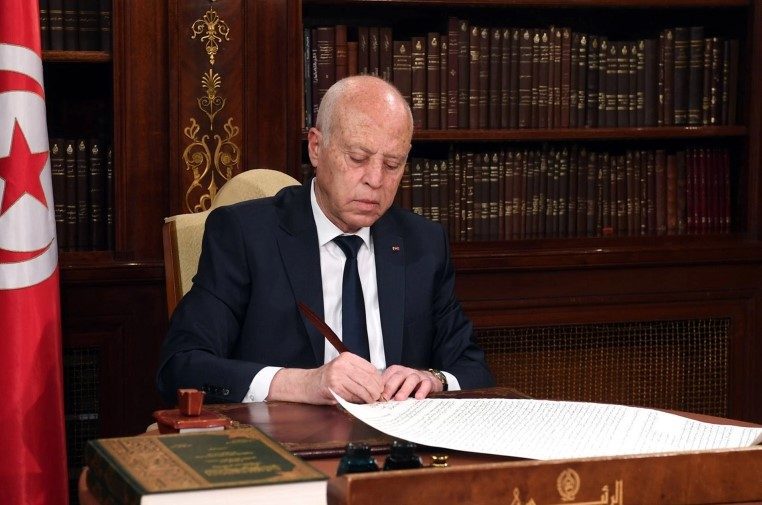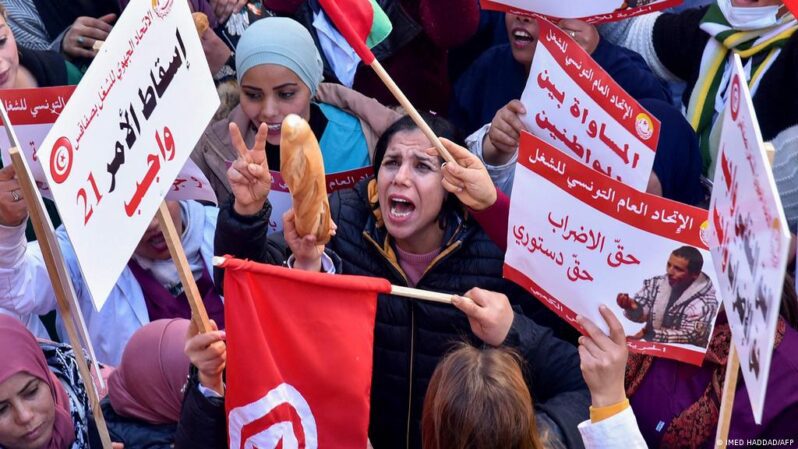The State’s Social Role Under Saied: Slogans and Token Financial Aid

During an interview with Shorouk News on 21 April 2022, Tunisian Minister of Social Affairs Malek Ezzeh revealed that the number of poor and marginalized people in Tunisia has risen to four million. He attributed the rise to sabotage and corruption that the country witnessed over the past decade, mentioned that the ministry has increased financial aid for this group, and emphasized his work and determination to achieve “real justice”. In a meeting between members of government and the Executive Bureau of the Tunisian General Labour Union on April 15, Prime Minister Najla Bouden – according to the published statement – expressed her desire for “the state to reclaim its social role as a welfare state that cares after all Tunisian citizens and guarantees the rights of workers, unemployed people, and vulnerable groups without discrimination”. Yet the prime minister and minister of social affairs are not translating this professed determination into reality through their policies. Given the adoption of an austerity policy, the near-monthly rise in fuel prices, the frequent absence and expensiveness of certain essential goods, and the agreement with the International Monetary Fund to cut subsidies, just what social state is the prime minister committed to realizing? What care does she promise citizens? And what “real justice” does she want to achieve?
A Failure to Develop New Policies
During the annual Martyrs Day celebrations on April 9, the President’s Office announced a ministerial session headed by President Kais Saied. The session discussed draft legal texts. The most important – according to the President’s Office – was presumably Saied’s draft on establishing a foundation, named Fidaa, for military victims of terrorism. The President’s Office focused on presenting and promoting this text at the expense of the ten others. The sidelined texts included the draft on establishing the Supreme Council for Social Development, despite the difficult social circumstances. The Ministry of Social Affairs, on the other hand, announced that this council will perform weighty functions. According to the ministry’s statement, the council will “set social policies aimed at reducing poverty and social and regional disparity and strengthening the social, educational, and economic integration of poor, low-income, and vulnerable groups, people with disabilities, and groups with special needs”. The council will thereby be the miracle cure for the country’s suffering.
The most important aspect of this future council may be what the President’s Office concealed. The idea of the council and its functions and responsibilities were set out in Law no. 10 of 2019 on Establishing the Social Security Program. Hence, it is the fruit of Parliament that Saied recently dissolved, one that grew from a proposal drafted by the previous system’s government. In the absence of any significant proposals by the exceptional measures system, and contrary to Saied’s professed break with the previous decade, continuing and effectuating existing failed projects was the most he and his government could offer. Apart from amending the Constitution and establishing bottom-up governance (the features of which remain undefined), the “new system” cannot develop any new vision or plan for the country as a whole, especially the state’s social role, despite repeated and broad statements about a commitment to doing so.
Distributing Aid and the Absence of Reforms
On 6 April 2022, the Ministry of Social Affairs announced a USD400 million – or approximately TND1.2 billion – funding agreement with the World Bank for addressing the pandemic. This money will be disbursed primarily as cash transfers to poor and low-income families.
Within two days, this announcement was complemented by two decisions from the ministers of social affairs and finance published in the official gazette. The decisions raised the cash transfers to poor families and families benefiting from social security from TND180 [USD60] to TND200 [USD65] per month. They also allocated an additional grant to each family for each of its children: TND30 [USD10] for children younger than six and TND10 [USD3] for children aged six to 18 (or 25 if they are pursuing education or occupational training).
Although the increase is warranted and may slightly benefit some marginalized groups, the total aid remains meager compared to the basic expenses of a decent life, especially given the fall in purchasing power and rise in inflation.
The minister of social affairs, as well as the government behind him, insists on reducing policies for supporting marginalized groups to direct financial aid, whereas these groups need several other services and clear state mechanisms to protect them. The choice to offer only cash transfers and no solutions or plans to rescue these groups from the cycle of poverty and precarity can only be explained through two hypotheses. The first is that the government and, primarily, the minister of social affairs, prefer easy solutions such as handing out cash to the poor instead of overseeing projects or programs subject to future evaluation. The second is that this operation is nothing but a publicity campaign that serves the interests of current officials to the detriment of these groups’ difficult circumstances – a campaign that goes hand in hand with the narrative adopted by the president and his inner circle.
What Remains of the State’s Social Role? The Case of the Social Defense Centers
Whichever of the aforementioned scenarios is true, the result is that the exceptional measures authority lacks proposals and solutions. This absence is evident in the 2022 budget for the Ministry of Social Affairs and its various bodies. Besides the fact that the ministry’s budget constitutes no more than 5% of the total state budget, development spending under the heading “Social Advancement Program” was reduced by more than 79% in terms of commitment and payment. This program is the ministry’s only one directed toward poor and marginalized groups. It aims to “reduce social exclusion, poverty, and inequality in society and to economically integrate vulnerable groups”, according to the ministry’s text. The program consists primarily of cash transfers and several services provided to vulnerable groups through the 24 Social Defense Centers distributed across Tunisia (one per governorate). These centers’ geographical distribution makes them the primary means of connecting with and serving marginalized groups in the regions and therefore the best target of investment intended to improve social services and find real solutions for them.
However, the government’s policy has gone in the opposite direction. Like its predecessors, the government has continued to sideline these centers by withholding the resources and capacities they need to perform their roles. The centers provide social, psychological, educational, and training services. They offer education to school-leavers aged between 13 to 16 through workshops in areas such as tailoring and drawing, and cultural activities such as theater and sport. They support at-risk children by studying their cases, advising family judges on their best interest, and providing them with psychological care. The centers also provide legal aid to children accused of crimes. The centers play a role providing legal and psychological direction and guidance, as well as training and support for these children and their families to integrate them into vocational training pathways. Besides all the above, the centers cater to the youth and elderly facing socioeconomic difficulties, single mothers, released prisoners, and unemployed people by providing psychological help and economic empowerment through enrollment in occupational training and employment pathways. The centers’ functions extend to families experiencing difficult circumstances such as the loss of the member supporting the family or the disability or addiction of a parent. The centers help them access welfare services (health, financial, and legal) in coordination with other institutions or enroll them in programs to provide a means of livelihood.
In short, these centers represent the first line from which marginalized and vulnerable groups seek state assistance. Yet they cannot perform their role for several reasons, the most important perhaps being the lack of resources directed toward them. In 2022, the budget allocated to each center for services is no more than TND10,000 [USD3,280]. In other words, the people running these centers must provide all these services – including education, rehabilitation, psychological support, workshops, and tracking beneficiaries – to various groups of differing ages and needs using less than TND800 [USD260] per month. Consequently, the centers must be selective and not provide these services to all eligible people across the governorate. For example, a center will only serve school-leavers who live nearby because it cannot cover transportation expenses. A center will be forced to select the children easiest to train because it cannot appoint experts to pursue difficult cases and lacks necessary facilities such as playgrounds and rooms for workshops. Likewise, some victims will be denied psychological care as psychologists are unavailable in some centers, either because they are performing administrative functions or because they retired and were not replaced amid the state’s austerity policy.
Hence, the state is vesting these centers with impossible tasks. It claims to have provided the institutions to deliver these services while depriving them of the resources they need to operate.
Contrary to its claims, the exceptional measures authority has opted to continue marginalizing these centers and the groups benefiting from them. Likewise, it has threatened to cut and reduce the quality of the assistance available to these groups through organizations by amending the Associations Decree and restricting their funding. This marginalization is clearly evident in the investment projects that the state allocated to the Social Advancement Program in the 2022 Finance Law. Instead of opening sports grounds or classrooms to teach youth how to use computers, opening libraries for children, establishing centers for women victims of violence, or raising these facilities’ capacity, the state opted to reduce development spending by the Ministry of Social Affairs and merely open one new social center and build a kitchen in another.
While the state institutions, the government, and their leaders, administration, laws, and executive apparatuses mobilize to build a kitchen and open one social center, Saied and his team are promising citizens radical changes that will deliver social justice and insisting they have a plan that will be the salvation of not only Tunisians but all of humanity.



